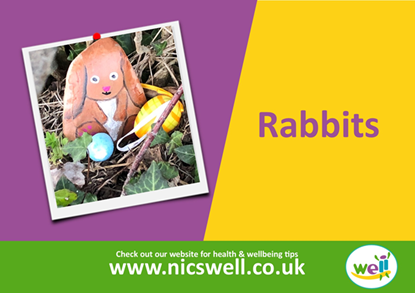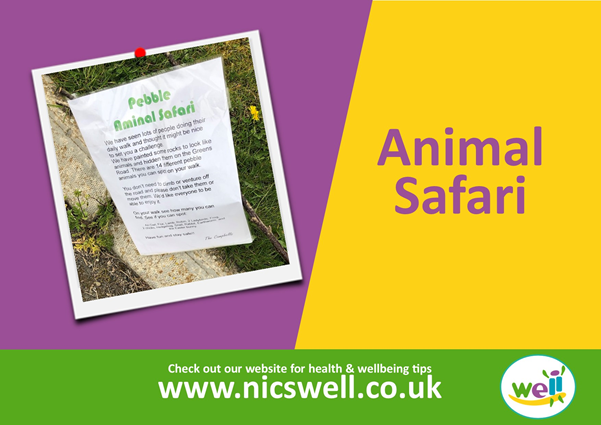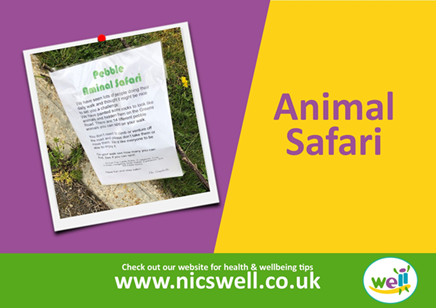Acts of Kindness, A Tale of Hens Eggs, Rabbits and an Animal Safari
Author: Gerry Kelly, NICSSA CEO.
A Tale of Hens Eggs, Rabbits and an Animal Safari
Hen’s Eggs
Walking down Green’s Road has become my daily routine following the lockdown in late March. It’s a quiet country road with a small sprinkling of houses and farms lining the 2-mile stretch.
I have driven up and down that road for over 25 years and really never took the time to notice anything about the road, the houses, the people, the land, the vegetation and the animals. Of course, all that changed on 23th March 2020 when I developed my new routine-a daily trek down the road.
Each day seems like a new adventure, meeting people from all walks of life who have been living in the area for over thirty or more years - farmers, builders and doctors to name but a few.
I have seen the most beautiful sunsets and sunrises, witnessed a full moon on a clear night against the towering backdrop of the Mournes in the distance, heard the sound of new lambs and the gallop of wild horses across the fields and witnessed some wonderful acts of kindness by local people.
It was on a late Friday afternoon walk just after the lockdown that I stumbled across the big white cooler box outside the house of a local family- the Campbells. In the box I discovered boxes of fresh laid eggs that the Campbells were giving to others in the community who were in need and those who were self-isolating.
Seven weeks later and they are still giving the hen’s eggs to others in need.
You may have noticed people in your community being a bit more thoughtful, a lot kinder and a bit more considerate recently. One of the very positive aspects of this global crisis is that even though we are being asked to keep our distance from each other we are establishing a sense of community and human connection with others through acts of kindness like the kindness shown by the Campbell Family on Green’s Road.
Have you considered that the measures to keep us apart right now, may be bringing us closer together with acts of kindness from others?

Rabbits
Did you know that being kind is actually good for your health?
While researching heart health and diet in two groups of rabbits, scientists discovered that acts of kindness really do make a difference to health.
In an experiment in the 1970s scientists were testing the heart health of two groups of rabbits. Both groups of rabbits were given unhealthy and very high-fat diets. Despite receiving the same heart-clogging foods, one group of rabbits was doing surprisingly well and much better than the other group.
At first, the scientists conducting the study were confused by the outcome of the study and couldn’t figure it out. Then, one day, they noticed something different in the group with a little more hop in their step. The researcher in charge of that group was showing them more attention than the other group. She would pick them up, talk to them and pet them.
Although the experiment was trying to discover the impact of diet on heart health, it stumbled upon a big piece of the wellbeing puzzle—kindness really does make a difference to health.
This study caught the attention of Columbia University psychiatrist Dr. Kelli Harding, who published a book titled The Rabbit Effect in 2019 in which Harding delved more deeply into the effects of kindness on the mind and body.
The morale of the story is that Acts of Kindness are actually very good for your health. Positive attention and care that you give your child or your spouse or others in your life does makes a positive difference, and not only to them.
Expanding on this theme there are numerous benefits from acts of kindness both to the giver and the receiver
- Kindness can increase feeling of self-worth, inner strength and energy.
- In many ways its similar to a medical anti-depressant as it pushes your body to produce serotonin, which is commonly known as the “feel-good” chemical that provides healing and calming feelings.
- In relation to stress, it has been shown that people that are more kind have 23% less cortisol (the stress hormone) and age slower than the average population.
- The University of British Columbia did a study on a group of highly anxious individuals in which they performed at least 6 acts of kindness a week. After one month, there was a significant increase in positive moods, relationship satisfaction and a decrease in social avoidance in socially anxious individuals.
- It may help lower blood pressure by creating emotional warmth, which releases a hormone known as oxytocin. Oxytocin causes the release of a chemical called nitric oxide, which dilates the blood vessels. This reduces blood pressure, and therefore, oxytocin is known as a “cardioprotective” hormone. It protects the heart by lowering blood pressure.

The Animal Safari
So, what’s the story of the Animal Safari. Well the Campbell children creatively used their time during lockdown to develop an Animal Safari Challenge for the local walkers. They painted animals on 14 small smooth pebbles which they carefully placed along the Greens Road and challenged the walkers to find them.
Everyone who walked the road took part in the challenge which created a lot of interest and excitement around the area.
I think it’s fair to say that many of us from the very young to the very old who completed the challenge found more than just painted animals!!


Thanks to the Campbells for their Acts of Kindness!
